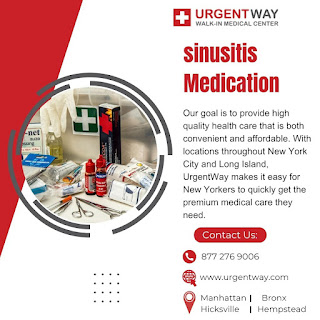What signs should I look out for that indicate my sinusitis medication isn't working effectively?
What signs should I look out for that indicate my sinusitis medicine isn't working effectively?
Introduction:
Sinusitis, often known as a sinus infection, is an unpleasant ailment caused by
inflammation of the sinus cavities. Many people find relief from sinusitis
symptoms through a mix of drugs and other treatments. However, it is critical
to know when sinusitis medicine may not be working properly. In this post,
we'll look at the indicators that your sinusitis medicine isn't working, the
possible causes, and what steps you may take to remedy the problem.
Understanding
Sinusitis Medication: To identify indicators of
ineffective sinusitis medication, it's important to first understand the sorts
of medications usually used to treat the ailment. Sinusitis drugs are often
classified into various groups, including:
Antibiotics are prescribed to treat bacterial sinus infections by targeting and
eliminating the bacterial germs that cause the infection.
Decongestants: These drugs relieve
nasal congestion by reducing enlarged blood vessels in the nasal passages,
allowing for better breathing.
Nasal
corticosteroids: These anti-inflammatory sprays
reduce inflammation in the nasal passages, which relieves symptoms like
congestion, nasal discharge, and face pressure.
Antihistamines: Used to treat
sinusitis caused by allergies, antihistamines inhibit the activity of histamine,
a substance generated during allergic reactions, lowering allergy symptoms such
as sneezing and itching.
Pain relievers: Over-the-counter
pain medicines, such as ibuprofen or acetaminophen, can help with sinusitis
symptoms like headaches and facial pain.
Signs Your Sinusitis Medication Is Not
Working:
Despite adhering to your doctor's advised treatment plan, you may discover
persistent or increasing symptoms, indicating that your sinusitis medicine is
not delivering the desired relief. Here are some signs to look out for:
Persistent
Nasal Congestion: If you continue to have severe
nasal congestion while taking decongestants or nasal corticosteroids as
prescribed, it could mean that your medicine isn't properly lowering
inflammation or swelling in the nasal passages.
Prolonged Facial Pain or Pressure:
Facial pain or pressure is a normal symptom of sinusitis, but if it persists or
increases over time despite pain relievers, it may indicate that your
medication is not effectively treating the underlying inflammation or
infection.
Recurrent Sinus Infections: Frequent
recurrences of sinus infections, especially if they occur soon after finishing
a course of antibiotics, may suggest that the drug did not completely eliminate
the bacterial infection or that your sinusitis has developed resistance to the
prescribed antibiotic.
Persistent
Fatigue or Malaise: Sinusitis can make you feel tired
and sick, but if these symptoms continue despite therapy, it may indicate that
your medicine isn't properly treating the underlying cause of your sinusitis.
Worsening Symptoms: If your
sinusitis symptoms intensify or do not improve after many days of treatment, it
is a strong indication that your present medication regimen is not working as
planned.
New Symptoms: The emergence of new
or unexpected symptoms, such as severe headache, visual problems, or high
fever, may suggest sinusitis complications that necessitate immediate medical
attention and treatment failure.
Lack
of Improvement in Quality of Life:
Finally, if your sinusitis symptoms significantly hinder your quality of life
and everyday functioning despite medication, it is possible that your present
treatment approach is not providing appropriate relief.
Reasons for ineffective sinusitis medication:
Several reasons may lead to the ineffectiveness of sinusitis medicine,
including:
Incorrect Diagnosis: Misdiagnosis of
the underlying cause of sinusitis might result in inefficient treatment. For
example, if your sinusitis is caused by allergies but is misdiagnosed as a
bacterial infection, drugs may not be effective.
Bacterial
Resistance: Antibiotic overuse or misuse can
contribute to the development of bacterial resistance, rendering certain
antibiotics ineffective in treating sinusitis.
Allergic Reactions: Some people may
develop allergic reactions to particular medications, rendering them
ineffective or generating negative side effects that outweigh the advantages.
Underlying disorders: Certain
underlying health disorders, such as nasal polyps or structural abnormalities
in the nasal passages, might impair the effectiveness of sinusitis therapy by
restricting airflow or preventing drug delivery to the affected area.
Environmental Factors: Environmental
irritants or allergens, such as pollen, dust, or air pollution, can aggravate
sinusitis symptoms and reduce treatment effectiveness.
Sinus
Infection Doctor At UrgentWay Walk-In Clinic:
Sinus infection treatment is
available at all UrgentWay locations. We are open seven days a week from
morning to evening, giving you the freedom to visit us whenever it is
convenient.
Our experienced providers will
assess your condition, advise the best sinus infection treatment accordingly
and counsel you on preventative care.
The infections vary in severity, and
in certain cases, substantial treatment is necessary. However, in most cases,
pain relievers such as nasal decongestants and nonsteroidal anti-inflammatory
medications are adequate remedies. Antibiotics may also be required to clear
the sinus infection.
If you are suffering from the unpleasant symptoms of sinusitis and need treatment quickly, then come to UrgentWay in New York to see our sinus infection doctor.
Conclusion:
Recognizing the indicators that your sinusitis medicine isn't functioning
properly is critical for controlling your disease and getting the most relief
from symptoms. By remaining attentive, seeking immediate medical assistance when
necessary, and actively participating in your treatment plan, you can
collaborate with your healthcare practitioner to resolve any medication
efficacy difficulties and reclaim control of your sinus health.




Comments
Post a Comment